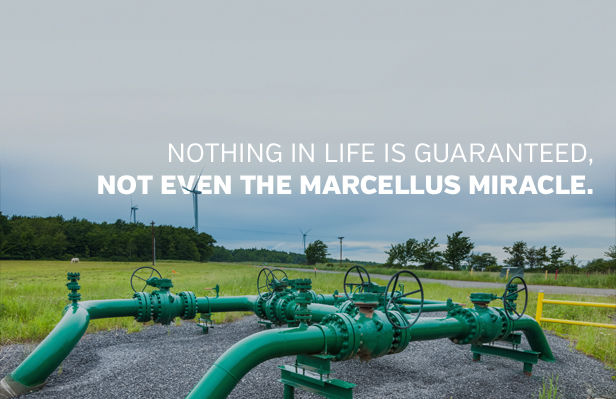Media

Those are Drilling Rigs, Not Money Trees
“Money doesn’t grow on trees,” my mother regularly declaimed in her impromptu lessons on financial literacy. Too bad she’s not with us to explain this to Governor Wolf: neither the Marcellus gas industry nor taxpayers are money trees ripe for picking.
The governor continues to call for higher taxes on natural gas producers to fund his “Restore Pennsylvania” infrastructure program and a carbon tax on consumers. Draining job creators and families dry won’t restore Pennsylvania—it’ll cause businesses and innovators to flee the state even more than they do already.
As we described recently, a carbon tax—euphemistically called “cap-and-trade”—has proven to be bad policy in neighboring states, which have experienced high costs for consumers and no benefits. It’s a myth that the gas industry has deep pockets ready for picking—years of low gas prices have caused plummeting profitability and layoffs.
“The shale gas revolution has frankly been an unmitigated disaster for the buy/hold investor,” says former EQT Corp. CEO Steve Schlotterbeck, according to the Pittsburgh Business Times. As the Times reported:
He said the producers must reduce drilling to maintenance capital levels for the next two years, and return the excess cash from operations to shareholders through dividends and buybacks. He said that strategy would allow natural gas prices to raise to a level—upward of $3.50 per thousand BTU—where producers can make money, shareholders can get returns and equity valuations that have dropped severely can improve.
Schlotterbeck’s analysis shows all but one of the major Marcellus natural gas producers have experienced dramatic drops in stock value. For example, EQT’s stock is down 40% since 2008 and Chesapeake’s 95%.
Nor do proponents of a severance tax seem concerned by the furloughing of 40 employees by gas driller Range Resources, as also reported by the Times:
A persistent, multiyear impact of low commodity prices has required Range to decrease spending in accordance with a reduced operations schedule,” Range told the Business Times. “Unfortunately, this includes the difficult decision to reduce staff in several of our office locations.
Stock dips and layoffs are canaries in the shale mine for an industry that enables so many others. The Marcellus Shale Coalition notes:
Pennsylvania is well-positioned to stimulate economic growth and create family-sustaining jobs. A McKinsey study funded by the Forge the Future initiative estimated that shale development could boost Pa.’s GDP by $60 billion, add more than 100,000 jobs, and generate billions in state tax revenue – if proper policies are in place.
Rather than pushing policies that undercut this growth potential, our leaders in Harrisburg should be leaning into this generational opportunity by encouraging a friendly environment for investment.
What does a friendly investment environment look like? For starters, lawmakers should consider state tax reform, including reducing the Corporate Net Income Tax, and normalizing Pennsylvania’s net and operating loss restrictions.
Rather than shaking down natural gas producers for every penny, let’s aim at helping businesses produce jobs and create wealth across the commonwealth.